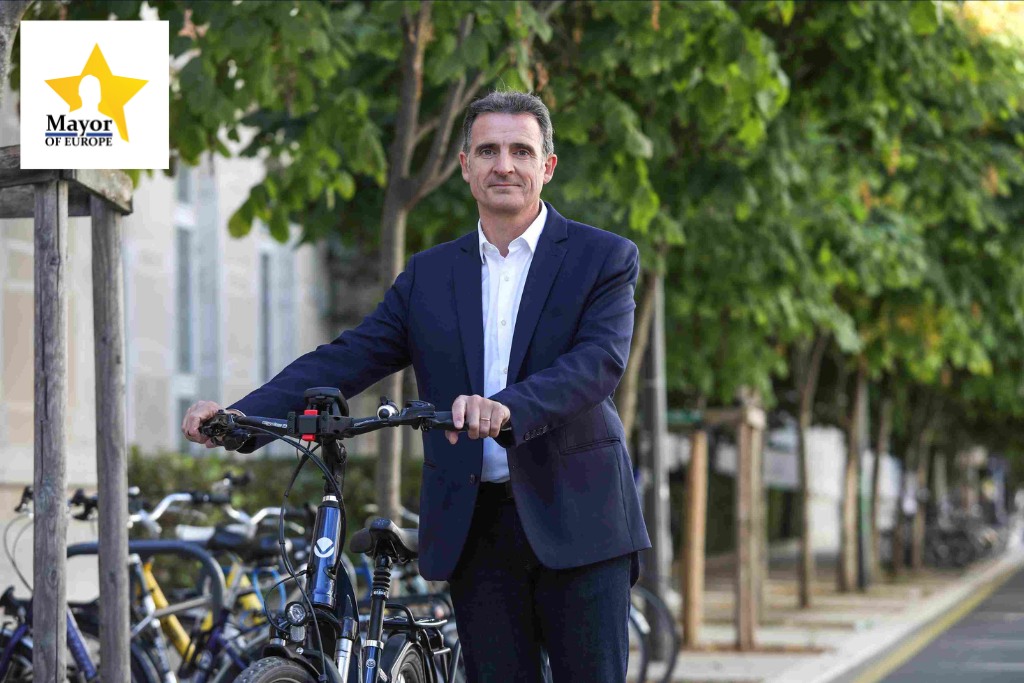Thessaloniki gets ready for its metro launch in November
The underground rapid transit lines have been under construction for almost two decades due to various project delays
 TheMayor.EU logo
TheMayor.EU logo 






Éric Piolle, Mayor of Grenoble, is the Mayor of Europe for “Green City” for May 2023
Our geography obliges us to act green
Eric Piolle has been the mayor of Grenoble since 2014. He became notable for being the first Green mayor of a large French city.
Under his leadership, the city has distinguished itself through numerous pioneering initiatives, such as the introduction of vegetarian menus in schools, the development of local and organic food in canteens, the development of cycling, fight against air pollution, massive investments in the production of renewable energy, reduction of energy consumption in public buildings, and elimination of advertising on public space.
Before getting involved in public life in 2010, Eric Piolle worked more than 18 years in the manufacturing industry. He has a degree in civil engineering from the Grenoble Institut National Polytechnique and has held senior executive positions throughout his career.
2022 was a very dynamic year: 900 foreign delegations came to discover our practices in terms of local democracy, cycling, urban planning, food, waste management, energy efficiency, energy production. 700 events took place in all areas of the city. 400 challenges were taken up by all the players around 12 themes. The public was able to hear lectures from our local Scientific Council on Air, Water, Biodiversity, Climate, Commons. 600 local academic, economic and associative partners got engaged to take a step forward, and say "OK, I'm committed".
Beyond the numbers, Green Capital of Europe 2022 was a way to engage the whole territory in the transitions.
As you know, we are nested in the Alps. And the Alps are twice as affected by climate change, so we must be twice as bold. Being the Green Capital of Europe 2022 was a way to build a common mobilization for the transition to solidarity and ecological innovation. Our geography obliges us.
Grenoble is a land of social and societal innovation, which makes it a land of pioneers.
The Green Capital of Europe 2022 has rewarded the efforts undertaken by Grenoble for many years to implement the necessary transitions. Between 2005, the year of the city’s first (and the first in France) climate plan, and 2016, emissions of greenhouse gases have decreased by 25%. Also, between 2005 and 2021, energy consumption in buildings have been reduced by 40%.
In 2015, we also removed advertising from public spaces. We multiplied bike usage in 8 years by a factor of three, started to collect and treat organic waste, and pedestrianized a large part of the city center.
These various results are the result of ambitious policies that we are committed to leading in Grenoble.
2022 was just the beginning for us, or shall we say - a springboard. Grenoble is looking further to prepare for new challenges that affect our entire planet. We launched the Grenoble 2040 dynamic, because that year is our horizon to reach carbon neutrality.
Babies born in 2022 will be 18 years old in 2040. Bringing the green "deadline" forward too far runs the risk of never freeing ourselves from the "urgencies of the short term". On the contrary, it is a question of freeing creativity and imagination, of giving space, while still remaining within a chronological limit that captures a human lifespan.
The concept of “climate justice” is fundamental: we now know that inequalities reinforce the climate crisis, and conversely - the climate crisis increases social inequality. The wealthiest emit the most greenhouse gases while the most vulnerable groups people suffer the most from the effects of climate change.
We are strengthening our public policies in the top three items of expenditure aimed at helping the most vulnerable people (housing, food and transport) plus emancipation. For example: measures to fight against energy insecurity, assistance to speed-up energy renovation of buildings, solidarity rates in canteens (an organic, vegetarian and balanced meal costs 0.7€ for the less well-off families), a municipal cycling school, targeted free-of-charge measures, free museums and libraries, etc...
Firstly, we are working closely with ICLEI through the European Climate Campaigners project (2021-2024) on behavioural change and the adoption of sustainable lifestyles by citizens. ICLEI is in charge of supporting the lighthouse cities involved - Grenoble is one of them and we work together almost on a weekly basis.
Furthermore, since we signed the Declaration of Circular Cities, the city of Grenoble has participated in the sharing of experiences through the 2022 reporting and seminars, by promoting the most relevant local initiatives, whether they are carried out by the City itself or the Metropolis.
On the themes of circular economy and just and green cities, we have responded positively to ICLEI's requests to testify at workshops with other European stakeholders (the first 'Policy Lab in the Art of Just-City-Making Series' organised by the EUKN in partnership with ICLEI Europe in April 2022, and the ICLEI workshop "Advancing local action on waste and the Circular Economy under the Green City Accord" in June 2022).
Last autumn, we had the honour of hosting and co-organising the 10th Informed Cities Forum with the teams involved in Civitas Sump-Plus, with the theme "Building better mobility relationships: Start with the city. Expand to individuals." Finally, we are currently working on opportunities to meet and work with ICLEI on the occasion of the Biennale of Cities in Transition organised by Grenoble from 8 to 11 June 2023.
All these experiences nourish our planning and our actions, as much at the political as at the technical level. The elected representatives and project officers of the City benefit from this relationship between the City and ICLEI.
Author: Vincent Iolov